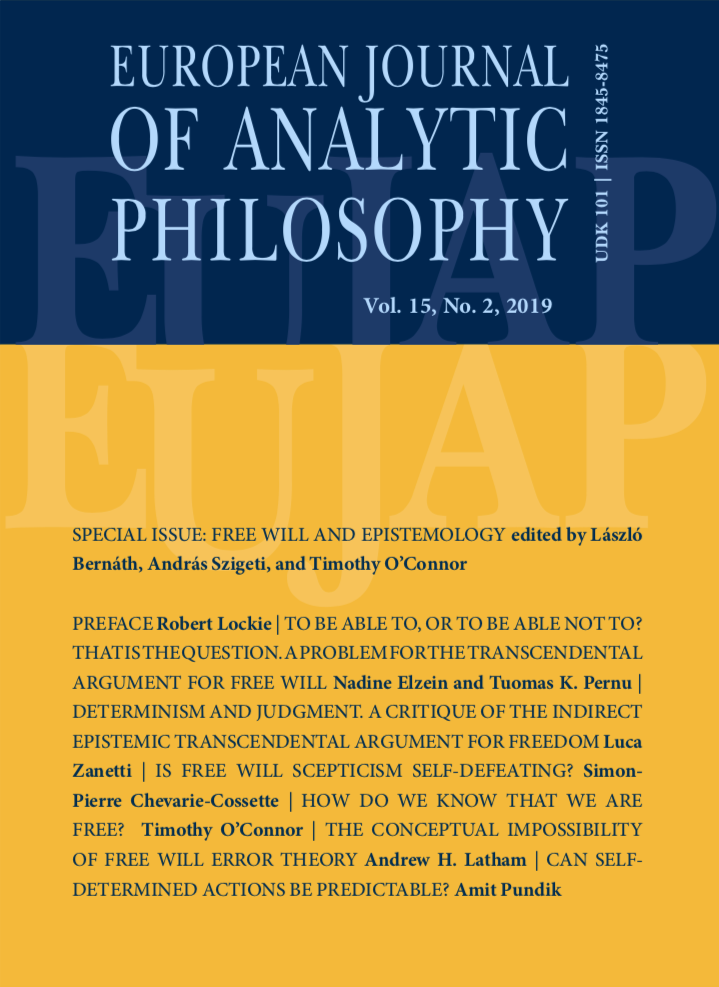View the whole issue here
- Double Vision, Phosphenes and Afterimages: Non-Endorsed Representations rather than Non-Representational Qualia
Işık SarıhanPages: 5-32 | Abstract | DOI: 10.31820/ejap.16.1.1
Pure representationalism or intentionalism for phenomenal experience is the theory that all introspectible qualitative aspects of a conscious experience can be analyzed as qualities that the experience non-conceptually represents the world to have. Some philosophers have argued that experiences such as afterimages, phosphenes and double vision are counterexamples to the representationalist theory, claiming that they are non-representational states or have non-representational aspects, and they are better explained in a qualia-theoretical framework. I argue that these states are fully representational states of a certain kind, which I call “automatically non-endorsed representations”, experiential states the veridicality of which we are almost never committed to, and which do not trigger explicit belief or disbelief in the mind of the subject. By investigating descriptive accounts of afterimages by two qualia theorists, I speculate that the mistaken claims of some anti-representationalists might be rooted in confusing two senses of the term “seeming”. - Knowledge and Assertion: A Critique of Lackey
Joshua AndersonPages: 33-52| Abstract | DOI: 10.31820/ejap.16.1.2
In the literature on assertion, there is a common assumption that having the knowledge that p is a sufficient condition for having the epistemic right to assert that p—call this the Knowledge is Sufficient for Assertion Principle, or KSA. Jennifer Lackey has challenged KSA based on several counterexamples that all, roughly, involve isolated secondhand knowledge. In this article, I argue that Lackey’s counterexamples fail to be convincing because her intuition that the agent in her counterexamples both has knowledge and do not have the epistemic right to assert is wrong. The article will progress as follows: In section 2, I present Lackey’s argument. In section 3, I suggest some more general reasons for doubting that the agent in her counterexamples actually has knowledge. I then show that from a virtue theoretic and Edward Craig’s practical explication of knowledge perspectives the agent in Lackey’ s counterexamples does not know. Since the agent in Lackey’s counterexamples does not have knowledge, she has failed to convincingly prove that KSA is false. In section 4, I conclude by suggesting that, at most, what Lackey’s counterexamples demonstrate is a problem with a simplistic evidentialist and/or process reliabilist epistemology. - Right to be Punished?
Adriana Placani and Stearns BroadheadPages: 53-74 | Abstract | DOI: 10.31820/ejap.16.1.3
It appears at least intuitively appropriate to claim that we owe it to victims to punish those who have wronged them. It also seems plausible to state that we owe it to society to punish those who have violated its norms. However, do we also owe punishment to perpetrators themselves? In other words, do those who commit crimes have a moral right to be punished? This work examines the sustainability of the right to be punished from the standpoint of the two main theories of rights—the will and the interest conceptions. The right to be punished is shown to be largely indefensible on both accounts: on the will theory, the right to be punished conflicts with autonomy, and it can neither be claimed nor waived by a perpetrator; on the interest theory, a perpetrator’s interest in punishment, inasmuch as it exists, is not sufficient to ground a duty on the part of the state. - Cyberbullying, Moral Responsibility, and Social Networking: Lessons from the Megan Meier Tragedy
Raphael Cohen-AlmagorPages: 75-98 | Abstract | DOI: 10.31820/ejap.16.1.4
This paper addresses the concepts of moral and social responsibility on the Internet in considering the most troubling phenomenon of cyberbullying that results in loss of life. Specifically, I probe the moral and social responsibilities of Internet users (agents), of the education system in fighting cyberbullying, and of Internet intermediaries. Balance needs to be struck between freedom of expression and social responsibility. The tragic story of Megan Meier serves as an illustrative example and some further incidents in which this ugly phenomenon of cyberbullying had cost young life are mentioned. It is argued that all relevant stakeholders need to think of the consequences of their conduct, that Internet abusers should be accountable for their wrongdoing, and that people who have the ability to stop or at least reduce the risk of cyberbullying should take proactive steps, exhibiting zero tolerance to cyberbullying. - Inference to the Best Explanation: The Case of Potential Energy
Peter J. RiggsPages: 99-116 | Abstract | DOI: 10.31820/ejap.16.1.5
It has been claimed that kinetic energy is an objective physical quantity whilst at the same time maintaining that potential energy is not. However, by making use of the method of ‘inference to the best explanation’, it may be readily concluded that potential energy is indeed an objective physical quantity. This is done for an example drawn from the foundations of modern chemistry. In order to do so, the criteria of what counts as ‘most probable’ and ‘most reasonable’ are defined and then employed for choosing the best explanation. - BOOK REVIEW: John McMillan THE METHODS OF BIOETHICS: AN ESSAY IN META-BIOETHICS, Oxford University Press, 2018
Iva MartinićPages: 117-122 | BOOK REVIEW
BOOK REVIEW John McMillan THE METHODS OF BIOETHICS: AN ESSAY IN META- BIOETHICS Oxford University Press, 2018 ISBN-13: 978-0199603756 ISBN-10: 0199603758 - BOOK REVIEW: Dražen Pehar PEACE AS WAR: BOSNIA AND HERZEGOVINA, POST-DAYTON, CEU Press, 2019
Višeslav RaosPages: 123-126 | BOOK REVIEW
BOOK REVIEW Dražen Pehar, PEACE AS WAR: BOSNIA AND HERZEGOVINA, POST- DAYTON, CEU Press, 2019 ISBN-13: 978-963-386-302-2

